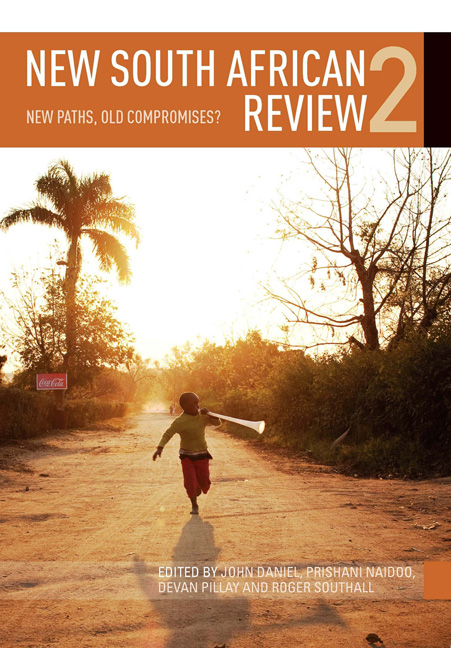Introduction: New paths, old (com)promises?
Published online by Cambridge University Press: 23 March 2018
Summary
THE PROMISE OF LIBERATION
Of the Reconstruction and Development Programme (RDP)'s stated aspiration to ‘fundamental transformation’ (African National Congress (ANC), 1994), an essay by the late Harold Wolpe (1995) noted that the ways in which the document ‘eradicated sources of contradiction and conflict by asserting a consensual model of society’ (Hart, 2007) meant that the very notion of fundamental transformation threatened to become a source of contestation. Seventeen years on, not only has this prediction turned out to be remarkably accurate, but politics in South Africa today seems ever more sharply polarised over the content of ‘the promise of liberation’ (Veriava, 2011).
As the ANC government has attempted to perfect and link its growth and development strategies, increasingly entrenching its neoliberal approach (from the RDP to the Growth, Employment and Redistribution Strategy (Gear) to the Accelerated and Shared Growth Initiative (Asgisa) and now the New Growth Path (NGP)), it has attempted to define the promise and the possibilities for its realisation according to the rationalities and limitations of this model. In so doing, it has come up against community and social movements that have put forward different understandings of the promise and asserted that many of the ANC's claims to realising the promise have been compromises, aimed at ensuring the reproduction of the fragile coalition between business, labour and government that has determined the nature of the transition (Ballard et al., 2006; Gibson, 2006; McKinley and Naidoo, 2004).
While in the pre-2006 period the leadership of the ANC Alliance was at pains to silence any hint of criticism of its policies from within its ranks, by 2007 and the showdown at Polokwane, differences and conflicts between members and factions of the alliance were being played out in the media, allowing it to re-present itself as a contested space in which debate and critique are cultivated, permitting change to happen from within the alliance, a throwback to its critics who had, on the basis of the experiences of the late 1990s and early 2000s, declared the ANC Alliance to be a space in which dissent and disagreement is silenced and contained.
- Type
- Chapter
- Information
- New South African Review 2New paths, old compromises?, pp. 1 - 18Publisher: Wits University PressPrint publication year: 2012



